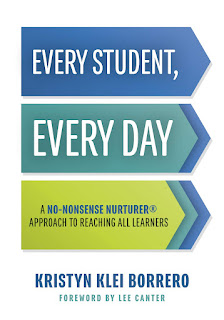No-nonsense nurturers build "life-altering relationships" with their students by creating an environment of achievement with precise directions, positive narration, and systems of accountability. - paraphrase of Borrero, Every Student, Every Day, pg 9
One of my favorite parts of being a teacher is the fraternity you join once you've spent your time in the classroom. I love being a part of the teacher squad. Everyone who was educated in public schools
thinks they know, but there's a shorthand that public school teachers can carry through their conversations that sometimes just feels like...magic.
That being said, far too often, those conversations can turn negative toward the students who were NOT successful in your room, and even worse, we quickly put the onus on the student as the reason for their failure (or lack of success of others in the class, too).
"I can teach anyone that wants to learn."
"I wish all of our kids wanted to learn like [insert honors student] does"
"Why'd that kid fail? They just came to play every day, if they came at all."
In all honesty, I wish I could say the quotes above were only things I'd overhead the teachers' lounge or at staff meetings, but they're also variations of things that I've said in the past about kids. It's...ugly.
Isn't the point of the teacher being there to reach the ones that DON'T want to learn? The kids that are ready to learn, that don't need that extra touch from a caring professional need us a lot less, right? If we only hold ourselves accountable for the kids who WANT to learn, then what are we even doing? What impact are you having?
Those of us that discover early on we want to get into education also tend to romanticize it, right? How many times did I watch Dead Poet's Society or Stand and Deliver in college or early in my career, putting myself in the Robin Williams role, or working at the board like the Hollywood version of Jaime Escalante? The teachers in most films about educators have the fairytale impact because they ignite and engage the students that "don't want to learn."
The aspect that excites me most about becoming a "No-Nonsense Nurturer" is their promise of 100% of students being 100% engaged, 100% of the time. It's true, being a teacher is sometimes enough of a challenge getting through the year with "the kids who want to learn," but legacies and impact are made on developing and implementing systems and strategies that find successes with ALL kids.
As long as we are implicitly or explicitly sorting children into groups of "learners" and "non-learners" or those who want to be there or don't, then we're going to leave kids behind. If you're still reading and you're a colleague of mine, please, I implore you - as a resident of this community, you have to hold yourself accountable for growth for all of your students. We cannot mentally write off any percentage of children each year as inevitable failures.
Let's keep each accountable to this. We can have that impact, every kid deserves it.


